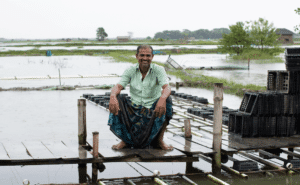Samakant: Master of the Rising Tide
Over the coming years, all of us will face the consequences of the changing climate in our daily lives. So now is the time to look to the pioneers, the people already applying ingenuity and co-operation to face the most devastating effects of climate change.

Samakant is a climate pioneer in Bangladesh, on the front line of the climate crisis. His positive actions are showing the rest of the world how to create a better, more resilient future.
Samakant Mistry lives in the coastal district of Satkhira in Bangladesh, close to the Sundarbans mangroves. Like generations of his family, Samakant was a rice and vegetable farmer. But all that has changed.
Over the last 10-15 years, sea-level rise and a series of severe cyclones have devastated the area. Much former farming land has been lost beneath the sea, and huge areas have been rendered toxic to plant life by saline water flooding the area. This makes rice and vegetable farming impossible. And so Samakant, like the rest of the community, had to adapt.
At first, they turned to the Sundarbans mangroves to find food. The Sundarbans are vital to Samakant’s community – not just for the food they provide, but for the natural flood protection they offer.
“The Sundarbans keep us alive in many ways. Our crabs, fish and honey are all collected there. If the rising sea had hit us directly, we probably wouldn’t be here.”
But with the community relying entirely on the local mangroves to survive, crab stocks became severely depleted, impacting local biodiversity. And once again the future of local families was in peril.
We’ve been working together with Samakant’s community to develop a more sustainable way to rear crabs from larvae. These nurseries provide a safe and sustainable farming system, where eggs from mature crabs are reared to create the next generation.
Putting his new farming skills to use, Samakant is now able to make a living year-round by selling the crabs. No longer dependant on crabs from the Sundarbans, he and his community are helping protect the wider biodiversity of the mangroves.
““In a short time, I can grow 3kg of crabs into 70-80kg of crabs. Now the pressure on the mangroves is less, and we can make a good profit.”
Samakant demonstrates our approach to helping the communities most impacted by climate change. It’s all about the power of locally-led solutions, scaled up to national levels. With your support, communities can adapt to the changing climate reality, prepare for extreme weather, and reuse and replenish our finite resources.